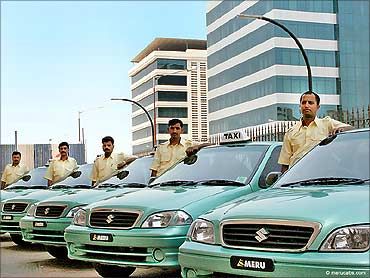 Meru Cabs and OlaCabs among radio cabs and bus ticket booking provider Redbus have been using big data analytics.
Meru Cabs and OlaCabs among radio cabs and bus ticket booking provider Redbus have been using big data analytics.
San Francisco-based radio cab service provider Uber started operations in India recently.
While one can book Uber’s luxury taxi service using a smartphone app, most Indian radio cab players, too, are using similar technology, making use of big data to understand the future demand scenario.
Companies such as Meru Cabs and OlaCabs among radio cabs and bus ticket booking provider Redbus have also been using big data analytics.
“By using this data and based on everyday predictability of data, we try to enhance the number of trips that one cab makes per day,” said Siddhartha Pahwa, chief executive officer of Meru Cabs, one of the earliest players which claims to have a customer base of about two million and a fleet of 5,000 cabs. It has been collecting data over the past six years.
About a year-and-a-half- ago, the average trip made by a taxi driver at Meru was four per day. This has improved to 5.8 trips now. Radio cab firms are also collecting data on traffic situation, road condition and speed, which they say help them offer better services to customers.
Take, for instance, OlaCabs, which has been mapping the demand-and-supply scenario from Day One of its operations.
This has given it insights into where the demand will peak, at what time of the day, so that they can place more cabs in that area. This is something Uber has been doing in the US.
“Since we can predict the demand, we can allow the cab driver who is closer to the location take the business. This reduces his travel time and gives him better returns. In general, the maximum capacity utilisation among taxis is 40 per cent. With us, drivers have increased their utilisation to 85 per cent by understanding what is the best time for them to make maximum business,” said Bhavish Aggarwal, co-founder and CEO.
OlaCabs is also using data analytics to come out with the right price for a destination depending on the traffic.
“At present, we also tell customers the expected time of reaching the destination. But this is an estimate that we give. Going ahead, we want to use data analytics and be able to tell customers the exact time to the destination,” added Aggarwal. OlaCabs, which works as an aggregator of cabs, has around 5,500
Meru Cabs has a dedicated team of people analysing the data. At Meru, although the call centre executive would say “no cabs”, he would still try and search for which cab in that area would be free and in how much time.
“This was a very manual intensive exercise. We already have all the cabs using GPS and the data is collected at our backend. Every car has a small screen that tells the status of the cab that is tracked back by our call centre. If a driver is reaching a certain destination at a certain time and there is a query from the same area, a light flashes on the screen. If the cab driver wants to take the job he just punches into the screen,” said Nilesh Sangoi, chief technology officer at Meru Cabs.
Meru was able to bring down its cancellation rate. Over a year ago, Meru had a cancellation rate of five-six per cent; it is now at three per cent. “Our loyalty has gone up from 63 per cent to 80 per cent. This also means our drivers have managed to increase their earnings by 30-40 per cent,” added Pahwa.
Internet bus ticketing firm Redbus has been collecting data since 2006. Using data, it can predict demand for a period of 30 days or more for the bus operators. This, in turn, allows the bus operators to price tickets accordingly and also ply more buses on certain routes.
“For us, every consumer clicking on our website is data. But the big challenge is what do you do with this data and how do you spot trends?
That is when we started using Google’s BigQuery data analytics services,” said Phanindra Sama, founder and CEO of Redbus. The company works with hundreds of bus operators serving more than 10,000 routes.
Redbus’ bus operators have also made money, thanks to data analysis. During summers, bus operators in Delhi ply a good number of trips between Delhi and Kulu Manali, but this trickles down significantly during winters.
“Our data suggested people were looking for buses to Kulu Manali during winters. We convinced bus operators to run a single bus on this route. To their surprise, they got good business,” said Sama.
Collecting data is just the first step. “Every consumer behaviour on our website is precious data. We have seen co-relation between site speed and consumer buying patterns. Data is an asset and the historical data that we have stored is a big advantage in future,” Sama added.








 © 2025
© 2025